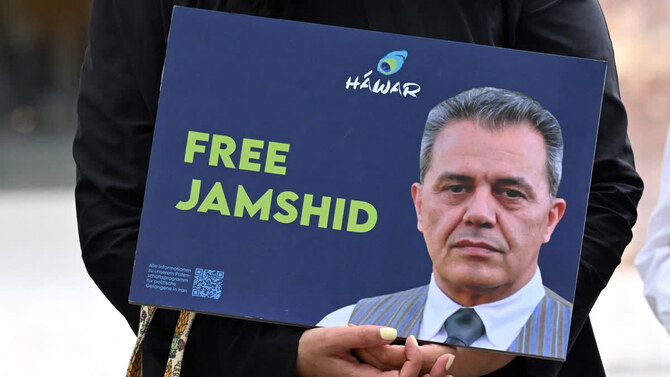TEHRAN: Iran’s Foreign Minister Abbas Araghchi on Tuesday lambasted remarks by his German counterpart Annalena Baerbock criticizing Iranian authorities over the execution of dual national Jamshid Sharmahd.
On Monday, Iran executed 69-year-old German-Iranian Sharmahd, who was sentenced to death in February 2023 for the capital offense of “corruption on Earth.” The sentence was later confirmed by the Iranian Supreme Court.
“No terrorist enjoys impunity in Iran ... A German passport does not provide impunity to anyone, let alone a terrorist criminal,” Araghchi said in a post on X, urging Baerbock to stop “with the gaslighting.”
Sharmahd had been convicted of playing a role in a 2008 mosque bombing in the southern city of Shiraz, in which 14 people were killed and 300 wounded.
His family said he was seized by Iranian authorities in 2020 while traveling through the United Arab Emirates.
Iran, which does not recognize dual citizenship, announced his arrest after a “complex operation,” without specifying how, where or when he was seized.
On Tuesday, Berlin summoned Iran’s charge d’affaires to “convey its strong protest against the actions of the Iranian regime.”
The German ambassador in Tehran also protested to the Iranian foreign ministry and was then recalled to Berlin for consultations.
Baerbock said Sharmahd’s killing showed that an “inhumane regime rules in Tehran” and vowed that it “would have serious consequences.”
In his post, Araghchi accused the German government of being an “accomplice in the ongoing Israeli genocide.”
He said Berlin was a top “provider of lethal weapons to Israel for its genocidal campaign in Gaza and carnage in Lebanon.”
‘Scandal’
Germany’s Foreign Minister Annalena Baerbock said the killing “shows once again what kind of inhumane regime rules in Tehran: a regime that uses death against its youth, its own population and foreign nationals.”
She added that Berlin had repeatedly made clear “that the execution of a German national would have serious consequences.”
“This underlines the fact that no one is safe under the new government either,” she said in reference to the administration of President Masoud Pezeshkian, who was inaugurated in July.
Baerbock expressed her “heartfelt sympathy” for Sharmahd's family, “with whom we have always been in close contact”, and said the German embassy in Tehran had worked “tirelessly” on his behalf.
German Chancellor Olaf Scholz also condemned the execution, calling it a “scandal” and adding that “Jamshid Sharmahd did not even receive the opportunity to defend himself against the charges at the trial.”
However, Gazelle Sharmahd accused both the German and US governments of “abandoning” her father in negotiations and said that the family had been ignored.
The director of Norway-based NGO Iran Human Rights (IHR), Mahmood Amiry-Moghaddam, called the execution “a case of extrajudicial killing of a hostage aimed at covering up the recent failures of the hostage-takers of the Islamic Republic.”
“Jamshid Sharmahd was kidnapped in the United Arab Emirates and unlawfully transferred to Iran, where he was sentenced to death without a fair trial,” said Amiry-Moghaddam, whose group closely tracks executions in Iran.
The European Center for Constitutional and Human Rights said: “The unlawful abduction of Sharmahd, his subsequent torture in custody, the unfair show trial and today's execution are exemplary of the countless crimes of the Iranian regime.”
Tool for fear
Sharmahd grew up in an Iranian-German family and moved to California in 2003, where he was accused of making statements hostile to both Iran and Islam on television.
Mizan said Sharmahd was “a criminal terrorist” who “was hosted by the United States as well as European countries and was operating under the complex protection of their intelligence services.”
Iran carries out the second highest number of executions worldwide per year after China, according to human rights groups including Amnesty International.
At least 627 people have been executed this year alone by Iran, according to IHR. Rights groups accuse the authorities of using capital punishment as a tool to instill fear throughout society.
Several other Europeans are still being held in Iran, including at least three French citizens.
European Parliament member Hannah Neumann, who chairs the assembly’s Iran delegation, called for a total change in the EU’s policy towards Tehran, the Bild daily reported.
“There were some voices who wanted to wait and see how the regime would develop after Pezeshkian's election,” Neumann said. “This terrible execution shows us clearly how we should judge this new government.”
























